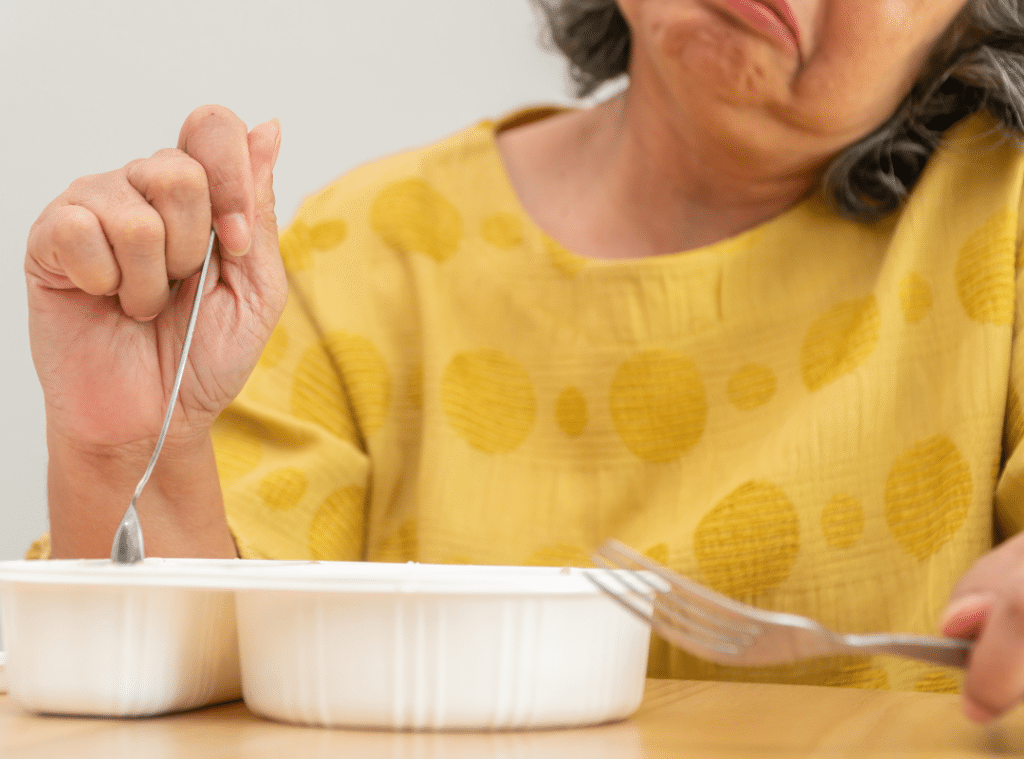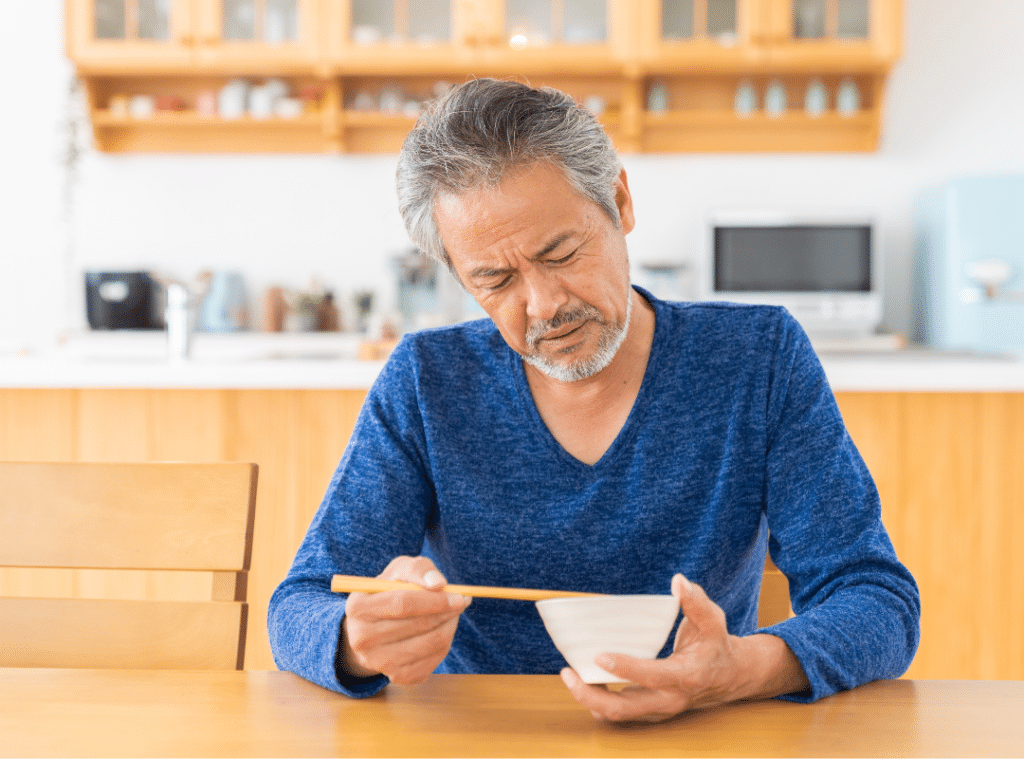When managing the lack of appetite in elderly seniors, understanding the causes, exploring effective strategies, and implementing practical solutions are essential. At The Oaks at Nipomo, we recognize that small, nutrient-rich meals can make a difference while creating a welcoming atmosphere enhances mealtime enjoyment. Additionally, involving seniors in meal prep might reignite their interest in food. However, there’s more to reflect on, especially regarding the underlying health issues that could be at play. What strategies can you adopt to guarantee your loved ones maintain their nutritional health?
Lack of appetite in elderly
Lack of appetite in elderly individuals is a common concern that can greatly affect their overall health and well-being. When seniors experience decreased hunger, it often leads to inadequate nutrition, which can increase the risk of illness and even mortality.
It’s essential to recognize that this issue isn’t simply a part of aging; it can stem from various factors like chronic illnesses, medications, or changes in taste perception.
Being attentive to these changes can make a significant difference as a caregiver or loved one. Watch for signs such as rapid weight loss or difficulty swallowing, as these may indicate a need for intervention.
Encouraging smaller, more frequent meals can help stimulate appetite, making it easier for older adults to consume the necessary nutrients. Additionally, implementing tailored dietary plans can provide personalized meal options that cater to individual health needs.
Creating a pleasant mealtime experience is equally important. Engaging in social dining or offering favorite foods can rekindle interest in eating.
Also, addressing hydration needs is important, as dehydration can suppress appetite. Understanding and addressing a lack of appetite can help your elderly loved ones maintain their health and quality of life.

What causes sudden loss of appetite in elderly
When an elderly person suddenly loses their appetite, it can be a sign of underlying health issues that shouldn’t be overlooked. This sudden change might stem from various factors, including medical conditions like infections, thyroid disorders, or even cancer. These conditions can greatly impact their desire to eat and overall well-being.
Medications they’re taking can also play a role. Certain drugs may cause nausea, dry mouth, or changes in taste, making meals less appealing.
Additionally, psychological factors like depression and loneliness can lead to a decreased interest in food, especially in seniors living alone.
Physiological changes due to aging, such as altered sensory perception and gastrointestinal issues, can further diminish appetite. A decline in taste and smell often occurs, making food less enjoyable.
It’s important to monitor these changes closely, as sudden appetite loss can lead to rapid weight loss and increased health risks. Good nutrition is essential for health and longevity, particularly in seniors, and addressing appetite issues is crucial for maintaining their overall well-being.
Consulting a healthcare professional is vital if you notice a sudden drop in your loved one’s appetite. Identifying the root cause can help guide appropriate interventions and support their overall health and quality of life.
Treatment for loss of appetite in elderly
Effective treatment for loss of appetite in elderly individuals often involves a multi-faceted approach tailored to their unique needs. It’s important to recognize the underlying causes, such as medical conditions or medications, that may be contributing to this issue.
Here are three effective strategies you can implement:
- Create Enjoyable Meals: Focus on making mealtime a pleasant experience. Consider incorporating favorite foods, engaging colors, and inviting aromas to stimulate appetite.
- Frequent, Smaller Meals: Instead of three large meals, offer smaller, more frequent meals throughout the day. This can make eating less overwhelming and can help guarantee they get the necessary nutrients.
- Hydration is Key: Encourage regular fluid intake, as dehydration can greatly impact appetite. Offer a variety of beverages, such as herbal teas or flavored water, to make hydration more appealing. Additionally, prioritize senior nutrition to support their overall health and well-being.
In managing a lack of appetite in elderly seniors, remember that every little bit helps. You can make a significant difference by incorporating smaller, nutrient-dense meals, creating a warm dining atmosphere, and encouraging social interactions. Don’t hesitate to involve healthcare professionals for personalized guidance and address any health issues. For further assistance, you can contact The Oaks at Nipomo at (805) 723-5206. With a little patience and creativity, you can help your loved ones nourish their bodies and spirits, ensuring they thrive during their golden years.
How Do The Costs Of Moving Into A Quality Senior Care Community Compare With The Costs Of Staying At Home?Compare The Costs of Senior Living vs Staying at Home
Questions About Appetite in the Elderly
What causes a lack of appetite in the elderly?
A lack of appetite in the elderly can result from various factors such as changes in metabolism, hormonal shifts, or side effects from medications. Psychological factors like depression, anxiety, or loneliness, as well as medical conditions such as chronic illnesses, digestive problems, or dementia, can also play a role.
Why do elderly individuals stop eating?
Elderly individuals may stop eating due to physical discomfort, difficulty chewing or swallowing, or changes in taste and smell that reduce food enjoyment. Medical conditions, emotional distress, or side effects from medication can also contribute to reduced interest in food.
How can you increase appetite in the elderly?
To increase appetite in the elderly, consider serving smaller, nutrient-dense meals throughout the day, incorporating foods they enjoy. Addressing underlying medical or dental issues, encouraging social meals, and adding natural flavor enhancers like herbs and spices can also help.
How do you treat appetite loss in the elderly?
Treatment involves identifying and addressing the underlying cause, such as medical conditions or medication side effects. A healthcare provider might recommend appetite stimulants, dietary changes, or supportive interventions like therapy for emotional distress.
Is it normal to lose your appetite when you’re older?
While some appetite changes are normal with aging due to slower metabolism and reduced energy needs, a significant or persistent loss of appetite is not typical. Investigating and addressing the underlying causes is essential to ensure proper nutrition.
What does it mean when an elderly person doesn’t want to eat?
When an elderly person doesn’t want to eat, it could indicate an underlying issue such as physical pain, depression, or an undiagnosed medical condition. It’s important to consult a healthcare provider to determine the cause and find appropriate solutions.
What is loss of appetite a symptom of?
Loss of appetite can be a symptom of a range of issues, including chronic illnesses like diabetes or heart disease, digestive problems, depression, or infections. It can also be an early warning sign of more serious conditions, such as cancer or cognitive decline, and warrants medical evaluation.








